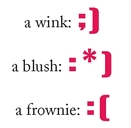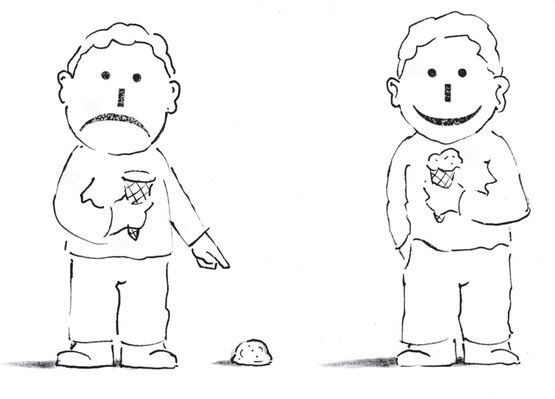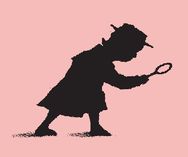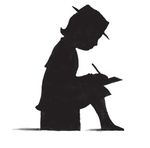The Word Snoop (20 page)
Authors: Ursula Dubosarsky

Some people like to put in a hyphen for the nose.

Okay, turn your head back the right way now.
The smiley started off in e-mails, to show that something was a joke (or at least not meant to be taken too seriously). Some people find that it’s hard to express emotions in written words alone, and so a smiley can take the place of tone of voice or the look on a face. If you got a message like this, for example:
PLZ COME NOW
you might think the person was saying crossly, ‘“Get here at once!” whereas what they really wanted to say was:

In other words, “Pretty please, I really really want you to come over now, pleeeeeease.”
The happy face was just the beginning—very quickly dozens of other symbols started appearing, like:


They’re all generally called smileys (or sometimes
emoticons
), even if they’re not smiling. Look on the Internet—you’ll find hundreds of them, as many as there are human feelings. There are different ones for different languages, and new ones being made up all the time. You’ve probably made up a few yourselves!
emoticons
), even if they’re not smiling. Look on the Internet—you’ll find hundreds of them, as many as there are human feelings. There are different ones for different languages, and new ones being made up all the time. You’ve probably made up a few yourselves!
Half the fun is making them up, and the other half is trying to interpret them, to understand what they mean. Here, have a quick smiley test—what do you think these could mean?


Well, now that we’ve come to the end of the book, I suppose it could mean that I’m
surprised,
or want to
kiss
you, or that I’m very very
angry,
but really I’m just:
 crying
crying
because the time has come to say . . .
surprised,
or want to
kiss
you, or that I’m very very
angry,
but really I’m just:

because the time has come to say . . .
Adieu! from the Word Snoop . . .

This is our very last code, Word Snoops. (Sob!) I had better make it a hard one. (Hint: I think you’re going to need your mobile phone.)
2.3 6.3 6.2 4.1 7.3 2.1
8.1 8.2 5.3 2.1 8.1 4.3
6.3 6.2 7.4!
8.1 8.2 5.3 2.1 8.1 4.3
6.3 6.2 7.4!
Dear Snoops,
This really is now the end of the book and the
end of my secrets (not ALL my secrets, mind
you, but quite a few of them). Just think of all
the strange things we’ve explored together on the
way. From anagrams and acronyms to tautologies
and tongue twisters, eponyms and exclamation
marks
—
and our journey has really only just
begun. There are so many astonishing things to
discover about words, I don’t think you could
ever come to the end of the secrets they hold.
end of my secrets (not ALL my secrets, mind
you, but quite a few of them). Just think of all
the strange things we’ve explored together on the
way. From anagrams and acronyms to tautologies
and tongue twisters, eponyms and exclamation
marks
—
and our journey has really only just
begun. There are so many astonishing things to
discover about words, I don’t think you could
ever come to the end of the secrets they hold.
My dear snoops, I’ve had a wonderful time
with you all. But I’ve been sitting at my desk
typing away for so long, I’m eager to travel
forth again into the wonderful wordy world
and make some new discoveries!
with you all. But I’ve been sitting at my desk
typing away for so long, I’m eager to travel
forth again into the wonderful wordy world
and make some new discoveries!
I hope we will meet again. I’m sure we will.
Would you recognize me, though, if you saw me?
I wonder…
I wonder…
In the meantime, keep brave! Keep bright!
Keep snooping! Yours ever,
The Word Snoop
Keep snooping! Yours ever,
The Word Snoop

Word Snoop Glossary
Acronym
—a word formed by using the beginning letters of other words. For example, CD for Compact Disc, or SCUBA for Self-Contained Underwater Breathing Apparatus.
—a word formed by using the beginning letters of other words. For example, CD for Compact Disc, or SCUBA for Self-Contained Underwater Breathing Apparatus.
Alphabet
—letters or signs of a language that represent sounds
—letters or signs of a language that represent sounds
Anagram
—a word formed by mixing up the letters of another word. For example, tale is an anagram of late.
—a word formed by mixing up the letters of another word. For example, tale is an anagram of late.
Backronym
—when the letters of a well-known word are used to make up a sentence. Sometimes this sentence reflects what the word actually means. For example, FEAR—Forget Everything And Run!
—when the letters of a well-known word are used to make up a sentence. Sometimes this sentence reflects what the word actually means. For example, FEAR—Forget Everything And Run!
Circumlocution
—using so many words to say something, it can be hard to work out what is actually being said
—using so many words to say something, it can be hard to work out what is actually being said
Cliché
—a well-known expression that has been used so often that it no longer carries as much meaning as it did originally. For example, quiet as a mouse.
—a well-known expression that has been used so often that it no longer carries as much meaning as it did originally. For example, quiet as a mouse.
Doublespeak
—using vague words and indirect expressions to hide the truth
—using vague words and indirect expressions to hide the truth
Eponym
—a word that is based on the name of a person. For example,
braille
after the French teacher Louis Braille, who invented the system.
—a word that is based on the name of a person. For example,
braille
after the French teacher Louis Braille, who invented the system.
Etymology
—the study of the history of words and their meanings
—the study of the history of words and their meanings
Euphemism
—indirect words and expressions used for things that are embarrassing or unpleasant to say. For example,
the ladies’ room
for “toilet” and
kick the bucket
for “die.”
—indirect words and expressions used for things that are embarrassing or unpleasant to say. For example,
the ladies’ room
for “toilet” and
kick the bucket
for “die.”
Homophones
—two words that sound the same but have different meanings and often different spellings. For example,
rows
and
rose
.
—two words that sound the same but have different meanings and often different spellings. For example,
rows
and
rose
.
Leet
—(short for
elite
) a kind of Internet and gaming slang that uses a lot of numbers
—(short for
elite
) a kind of Internet and gaming slang that uses a lot of numbers
Lipogram
—a piece of writing in which the author deliberately leaves out a specific letter of the alphabet
—a piece of writing in which the author deliberately leaves out a specific letter of the alphabet
LOL
—(short for Laugh Out Loud) an Internet slang language that uses many of the features found in texting. For example, using acronyms and numbers instead of letters, and deliberate misspellings such as woz for was.
—(short for Laugh Out Loud) an Internet slang language that uses many of the features found in texting. For example, using acronyms and numbers instead of letters, and deliberate misspellings such as woz for was.
Malapropism
—misusing words or expressions in a way that is funny. For example, Aunt Artica for
Antarctica
.
—misusing words or expressions in a way that is funny. For example, Aunt Artica for
Antarctica
.
Mnemonics
—tricks and techniques that people use to help them remember things. For example, the sentence Every Good Boy Deserves Fruit helps people remember the order of the notes on a music stave: EGBDF.
—tricks and techniques that people use to help them remember things. For example, the sentence Every Good Boy Deserves Fruit helps people remember the order of the notes on a music stave: EGBDF.
Mondegreen
—a word or phrase that is misheard, usually from song lyrics. For example, “When a man loves a walnut” instead of “When a man loves a woman.”
—a word or phrase that is misheard, usually from song lyrics. For example, “When a man loves a walnut” instead of “When a man loves a woman.”
Nickname
—an extra name for someone or something, which is usually affectionate and often funny
—an extra name for someone or something, which is usually affectionate and often funny
Other books
Andrea Kane by Dream Castle
Surrept by Taylor Andrews
House of Gold by Bud Macfarlane
Ellray Jakes the Dragon Slayer by Sally Warner
Maid of Dishonor by Heidi Rice
The Mask of Apollo by Mary Renault
La inteligencia de las flores by Maurice Maeterlinck
Merry's Christmas: A Love Story by Susan Rohrer
In Your Honor by Heidi Hutchinson
His Holiday Family by Margaret Daley
